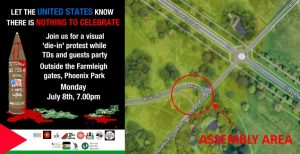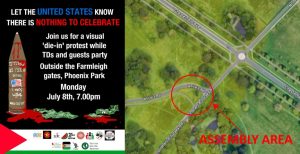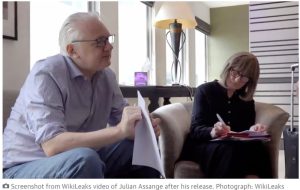Palestine: the end of isolation?
Feature by Estelle Cooch, June 2011
The Arab revolutions threaten to break the networks of control erected by the US and Israel. This has particular significance for Palestinians, whose oppression has been enabled by the collaboration of Arab regimes with Israel. Estelle Cooch asks whether Palestine’s isolation may be coming to an end
On 15 May each year Palestinians have commemorated Nakba Day, "the catastrophe", the day of Israel’s establishment in 1948 that oversaw the expulsion of hundreds of thousands of Palestinians from their homes.
This year was different. As hundreds of Palestinian refugees clambered over the fence from the Syrian border into the occupied Golan Heights and towards occupied Palestine it was difficult not to be stunned. These mainly young refugees, who have known nothing but border camps and exile, scrambled through fields ridden with landmines with only one thought in mind: "We want to go home. We want the right to return." It was Israel’s worst nightmare.
Palestine: the end of isolation?
Feature by Estelle Cooch, June 2011
The Arab revolutions threaten to break the networks of control erected by the US and Israel. This has particular significance for Palestinians, whose oppression has been enabled by the collaboration of Arab regimes with Israel. Estelle Cooch asks whether Palestine’s isolation may be coming to an end
On 15 May each year Palestinians have commemorated Nakba Day, "the catastrophe", the day of Israel’s establishment in 1948 that oversaw the expulsion of hundreds of thousands of Palestinians from their homes.
This year was different. As hundreds of Palestinian refugees clambered over the fence from the Syrian border into the occupied Golan Heights and towards occupied Palestine it was difficult not to be stunned. These mainly young refugees, who have known nothing but border camps and exile, scrambled through fields ridden with landmines with only one thought in mind: "We want to go home. We want the right to return." It was Israel’s worst nightmare.
Since the overthrow of Hosni Mubarak there has been a yearning among Palestinians to join in the revolutions that have swept the Arab world. Their hopes have been raised by two significant developments in Egypt: the promise that the Egyptian controlled Rafah crossing into Gaza will be permanently opened, and the brokering of a unity deal between Hamas and Fatah by the Egyptian army.
Yet when Egyptians protested in support of Palestinians on Nakba Day they were shot at by the army in Cairo. Similarly when Palestinians in Ramallah protested in early February in support of the Egyptian Revolution the Palestinian Authority smashed up the demonstrations.
Mood for change
It is clear that the Egyptian Revolution has transformed the political situation facing Egyptian, Palestinian and Israeli leaders and created a new mood for change among the Palestinian masses, both inside and outside the occupied territories.
This raises important questions. How does the Egyptian army plan to manage the remnants of Mubarak’s chummy collaboration with Israeli apartheid? How will the reconciliation deal between Hamas and Fatah change the face of Palestinian politics?
Several aspects of the special relationship between Mubarak’s Egypt and Israel are worth restating. Part of the reason that there exists such a strong sense of solidarity between Egyptians and Palestinians goes back to the formation of Israel in 1948. As the historic leader of the Arab world, Egypt assumed a certain responsibility for the fate of Palestine. In 1952 support for the Egyptian army officers’ coup over a British backed monarchy was partly fuelled by Egyptian shame after abandoning the Palestinians four years previously.
But following Egypt’s unequivocal defeat by Israel in the Six Day War in 1967 Palestinian hopes for serious regional resistance to Israeli occupation crumbled. Nasser admitted, "I have the courage to tell our people the unfortunate truth – that whether they like it or not the Americans are masters of the world." With this any hopes for genuine resistance from the Arab leaders to Israel and American imperialism dissipated entirely.
Egypt later become the first Arab country to sign a peace deal with Israel, the Camp David brokered peace treaty in 1979. The United States rewarded Egypt with an unprecedented flow of arms and money. Between 1977 and 2007 Egypt received almost $62 billion dollars from the US in economic aid and foreign military assistance. The only state to receive more has been Israel. But perhaps the more important aspect of Camp David for Israel was the removal of any threat on its southern border.
The Palestinians were left isolated, freeing Israel to smash the Palestine Liberation Organisation’s bases in Lebanon in 1982, something it has never quite recovered from. The way was paved for a "peace process" that the leaked Palestine Papers, which revealed the internal negotiations between Israeli and Palestinian representatives, have confirmed was from its very origins a complete farce.
The 1993 Oslo Agreement between Palestinian leader Yasser Arafat and Israeli prime minister Yitzhak Rabin saw Arafat conceding 78 percent of Palestine, abandoning the prospect of the "right of return" of refugees cleansed from Israel in 1948 and 1967. For Israeli historian Avi Shlaim, "There was no comprehensive attempt to solve the conflict, but that progress in negotiations, or even the negotiations themselves, became more important than the results."
Mubarak’s support for the Oslo Accords and the "peace process" became a major point of protest for ordinary Egyptians. After the second Palestinian Intifada broke out in September 2000, up to a million Egyptians protested in the biggest protests since the bread riots of 1977. In April 2002 pro-Palestinian riots at Cairo University led to chants of "Hosni Mubarak is just like Ariel Sharon".
Unstable border
If Israel faces a very different opponent on its Lebanese border today in the shape of Hezbollah, which inflicted a stunning defeat on the Israeli army in the 2006 war, the Egyptian Revolution has left Israel’s southern border looking troublingly unstable.
The revolution has put pressure on the Egyptian Supreme Council of the Armed Forces (SCAF) to at least verbally distance themselves from the Mubarak regime. In April 2011 Egypt announced its intention to permanently open the Rafah crossing into Gaza. Israeli daily Ha’aretz said "The announcement indicates a significant change in the policy on Gaza, which before Egypt’s uprising, was operated in conjunction with Israel." Egyptian chief of staff General Sami Anan warned Israel not to get involved saying, "Israel has no right to interfere in the issue of the opening of the Rafah crossing. This is an Egyptian-Palestinian matter." Such rhetoric was unheard of under Mubarak’s regime.
Yet the second action to which SCAF has been central is perhaps long-term even more significant. On 27 April Hamas and Fatah announced plans to form a national unity government and along with 11 other smaller Palestinian groups endorsed an agreement in Cairo. In the midst of the Arab Spring both Hamas and Fatah had begun to appear as part of the ancien regime – the popular support Hamas enjoyed has begun to ebb and Fatah is heading an increasingly unpopular donor dependent Palestinian National Authority led by Western-backed prime minster Salam Fayaad, a former IMF official who famously boasted that he had never been on a demonstration, and who lacks any popular base of support. The unity deal allows both to regain the political initiative and place themselves once again at the centre of the Palestinian struggle.
There are problems with the unity deal, notably how Hamas will deal with Fatah’s collaboration with Israel in the West Bank. Documents released by al-Jazeera showed PLO negotiator Saeb Erekat boasting that "we even killed our own people" for "security work" for Israel. Such security collaboration is expected to continue and Hamas will begin to share responsibility for it, if the deal holds.
The deal will also have ramifications for the plan to unilaterally declare a Palestinian state this September and apply for membership of the UN General Assembly. If the state is admitted it will be little more than a sovereign bantustan, yet Hamas do not want to be left out of the equation entirely. The 573 permanent barriers and checkpoints in the West Bank, and 54 percent of the West Bank annexed by Jewish-only colonies and roads will remain untouched. In an interview with the online blog Electronic Intifada, Saeb Erekat admitted the new state would enter into "land swaps" with Israel. But as Ali Abunimah, editor of Electronic Intifada, explains, "in other words, [president of the PA] Abbas is seeking ‘sovereignty’ at the UN to do precisely the thing real sovereign states don’t do, which is cede territory to an invading, colonising occupier."
Despite the undoubtedly questionable motivations of some, it represents an incredible shift in Palestinian domestic politics. The deal has come after thousands have protested for unity in the past few months. The reaction to the deal was particularly telling. Israeli prime minister Benjamin Netanyahu condemned Fatah’s deal with Hamas as a "mortal blow to peace and a great victory for terrorism", and refuses to negotiate with the "Palestinian version of Al-Qaida".
Yet at the same time in the Jerusalem Post he was condemned by historian Zeev Sternhell for putting Israel "on course to becoming a pariah state". Sternhell also raised the fear of much of the Zionist establishment that international pressure for an academic and economic boycott of Israel is growing from the "recognition that there is no other way to force Israel to end the occupation". The unity deal has terrified the Israeli establishment who fear the growing confidence that the Egyptian revolution has given Palestinians.
Nakba
The Nakba Day demonstrations inside Palestine were also matched with huge demonstrations across the Arab world. Both inside and outside the Arab world Palestinian civil society calls for a Boycott, Divestment and Sanctions movement are gaining growing support. Israeli deputy prime minister Ehud Barak recently exclaimed that Israel is being "cornered to the place from which South Africa began to deteriorate".
But unlike in South Africa, where the apartheid system rested on black workers, giving them enormous power, Palestinians have been forcibly expelled from Israel’s economy. This underlines the importance of the wider Arab working class across the region in the struggle to liberate the Palestinians.
The Arab revolutions have also created new tensions in the US-Israel relationship. In the week following the Nakba Day protests Obama called for the borders of Israel and Palestine to be based on the 1967 lines, a demand the Palestinian Authority rarely promotes any more. It reflected Obama’s attempt to place the US at the head of calls for change in the region, with the aim of influencing and ultimately containing the revolutionary process that is unfolding across the Middle East.
Obama’s speech provoked outrage in Israel, and so far his administration has a dismal record of actually putting real pressure on Israel, for example over continued settlement building programmes. But the US-Israel relationship is only likely to become more contradictory as the Arab Spring progresses.
The re-emergence of popular struggle, the huge spike in international solidarity and the fact that Fatah and Hamas have been forced to unite all show that the Palestinian revolution is coming back to life. It is the Arab revolutions – the Egyptian Revolution in particular – and the genuine solidarity between the working classes of the Arab world that have given the Palestinian struggle new impetus. The Palestinian revolution may have been 63 years in coming, but the road to Jerusalem will indeed run through Cairo.






